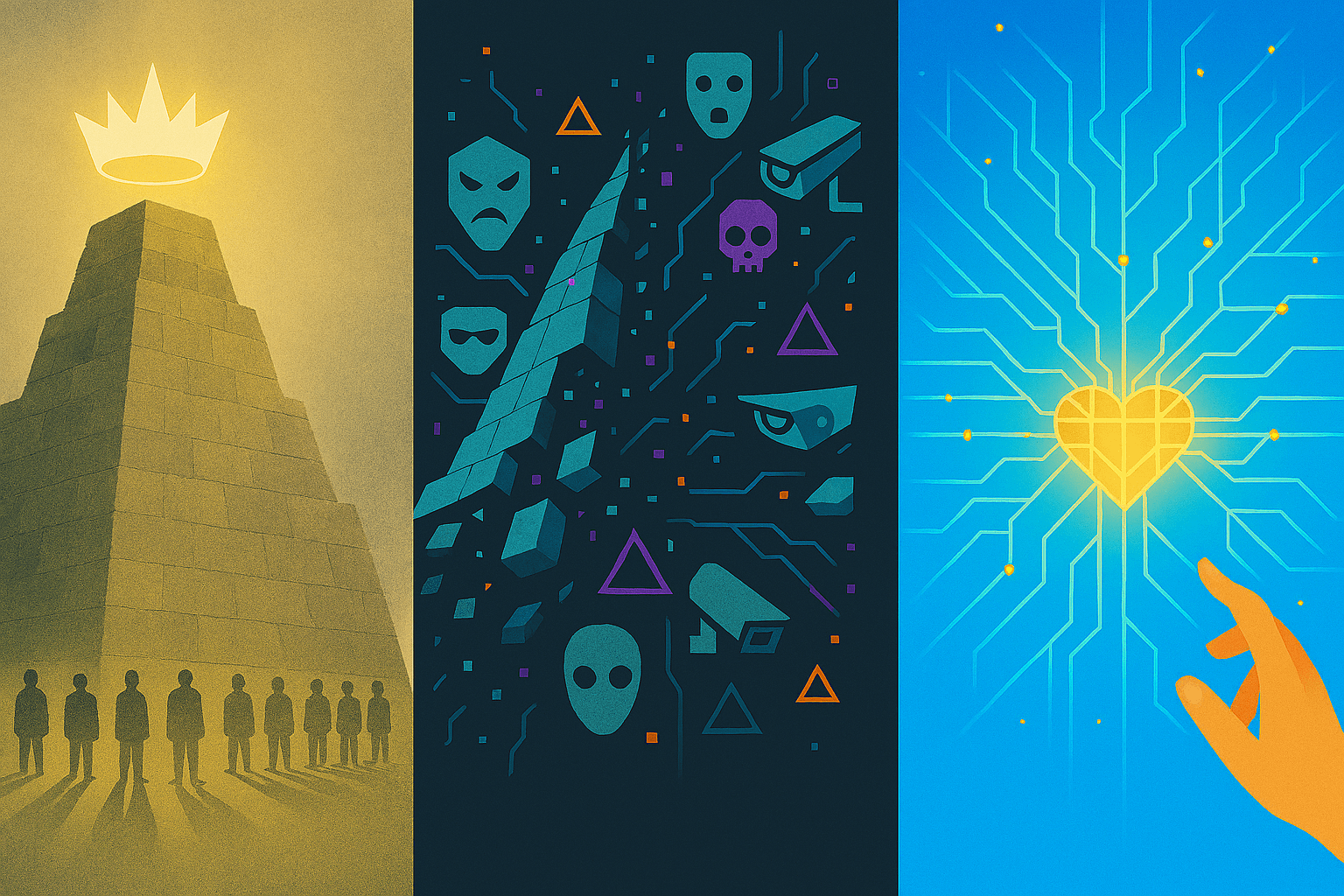The Evolution of Power: From Tribal Chief to Ethical Protocol

Part 1: The Origins of Power: How the State Arose
The history of humanity is, in essence, the history of the search for an optimal form of power. From the informal authority of an elder in a tribe of hunters to the complex bureaucratic systems of modern states, we have constantly created and rebuilt mechanisms that allow us to live together. Today, we find ourselves at a unique turning point, where the very nature of power is changing before our eyes. To understand where we are heading, we must first remember where it all began.
In the dawn of humanity, in societies of hunters and gatherers, there was no state as such. Power was informal and based on authority, not coercion. Everything changed with the Neolithic Revolution—the transition to agriculture. This triggered a chain reaction: food surpluses appeared, the population grew, and social inequality emerged. Society became so complex that the old mechanisms of governance ceased to work.
On this foundation, chiefdoms began to form—a transitional stage to the state. Here, power was concentrated in the hands of a chief who relied on three key mechanisms:
- Economic: The chief controlled and redistributed surplus products, collecting them as tribute. Control over resources became the basis of power.
- Military: The chief was also a military leader, protecting his tribe. His loyal retinue became the core of his power base.
- Ideological: The chief's power was sanctified by religion, which made it legitimate in the eyes of the people.
The true state was born when the personal power of the chief transformed into an impersonal and permanent institution. The key features of this transition were a monopoly on legitimate violence, the extension of power over a clearly defined territory, the emergence of an administrative apparatus (bureaucracy), and the introduction of mandatory taxes. This model of hierarchical, centralized power proved so successful that it became the universal "operating system" for human societies for thousands of years, but its era may be coming to an end.
Part 2: The Great Disruption: The Transformation of Power in the 21st Century
In the 21st century, this time-tested system faced a fundamental crisis caused by forces its creators could not have imagined. The information revolution and globalization have undermined all three pillars of the traditional state. The monopoly on information vanished with the advent of the internet, the monopoly on the economy was broken by transnational corporations, and the monopoly on violence is increasingly challenged by non-state actors.
Power has not disappeared, but has begun to flow uncontrollably into new, hybrid forms that exist in parallel with, or even above, the state:
- Corporate Power. The largest tech giants have created their own digital ecosystems with their own rules. They control information flows and influence our lives sometimes more profoundly than national governments.
- The Power of Algorithms (Algocracy). We increasingly delegate decision-making to artificial intelligence. This new form of power is efficient but completely non-transparent and unaccountable to humans.
- Network (Distributed) Power. In the global network, influence is held not by those in formal positions, but by those who are important nodes for the flows of information and finance.
This shift is happening spontaneously, driven by the logic of profit and technological development, but without any ethical oversight. We find ourselves in a paradoxical situation: humanity has created the most powerful tools in its history, yet is losing control over how they shape our social reality and power structures.
Part 3: In Search of a Compass: Civethica as an Attempt to Govern the Future
Faced with this chaos, as power flows spontaneously to opaque algorithms and global corporations, humanity is beginning to search for an answer. And this answer is not an attempt to return to the past, but an ambition to design the future. It is in this context that projects like Civethica emerge, which can be seen as one of the first conscious attempts to manage this unmanageable change.
Projects of this kind propose not to fight the old power or submit to the new, but to create a third alternative that performs a regulatory function on entirely different principles:
- Regulation through Protocol, Not Law. Instead of passing laws that can be broken, the proposal is to create technologies and social platforms where ethical rules are "built into" the very architecture. Power here is regulated not by punishment, but by the design of the system itself.
- Regulation through Alternative, Not Coercion. Such projects cannot force corporations to change. But they can offer people an attractive alternative—ecosystems built on principles of transparency and justice. By creating competitive pressure, they compel old players to adapt.
- Regulation through a Moral Compass, Not Bureaucracy. By articulating clear ethical principles for the digital age, they provide society with a language to discuss the future and a moral guide. When an understanding of what is ethical becomes culturally embedded, it eventually begins to influence everything.
Thus, initiatives like Civethica are not just philosophical exercises. They are practical attempts to design a new, more humane "operating system" for 21st-century society. They symbolize the transition from passive observation of the transformation of power to the active and conscious construction of our common future. We are living in the interval between two eras, and the work of writing the code for the next one has already begun.
